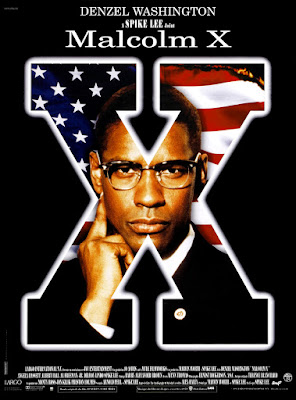As I started watching Spike Lee’s 1992 biographical film Malcolm X on TCM this week I recalled that I once wrote a paper on Malcom X at a fairly young age in school—could’ve been elementary school, could’ve been middle school. The only thing I remembered was that I did the paper and little else besides that he was a civil rights thought leader and that the general impression I got was that he was a bit militant. In this case my ignorance made the film more compelling as Lee’s film quickly pulled me in and blew away any expectations I had.
The key to this film, for me, was the intensity in which Malcolm approaches each period of his life. Starting as a cocksure criminal, to his full-bore prison humbling and conversion, to his staunch and righteous leadership among his Muslim brotherhood, it is in the final stage of his life that the intensity starts to settle and transform to acceptance, openness, and humility. Each stage portrayed is built on a foundation carefully laid by Lee and his co-writer Arnold Perl. It provides the audience an understanding of Malcom’s character development, showcasing his strengths but not shying away from his blindspots.
Even knowing a few overarching details about his life, each change in his character, including and especially how he started his adulthood as a hustler, is a surprise. In each era of his journey he runs up against a wall and is willing to completely throw away his old self in order to adapt a system that makes more sense than the last. In the first, his street life is a reaction to the trauma of his younger years. He learns to just focus on himself. He is skilled and can get lots of women, alcohol, and drugs. Then in prison he abandons that by adapting a worldview that tells him how the world has been conspiring against him and his brothers who he must build up through the teachings of a great and admirable man. Finally, he sees the flaw in following man at all, and for abandoning that for a higher center of focus, he is rejected by his own people and slain.
It’s powerfully told with some stylistic flares from early-90’s Spike Lee that bring you to the edge of your seat where other biographical epics of this scale would induce a yawn. These include low-angled, tilted ultra close-ups; vibrant long-shots highlighting Harlem and other settings; remix of archival footage; the opening intro and closing coda; and flashes of visceral, mind’s eye, psychological imagery, not to mention time period juxtaposition, like the flashback shot of him and his father both with their guns in hand protecting their families and fleeing their burning homes. At the same time, Lee also gets all the majestic, grandstanding, autobiographical mainstays just right, i.e. rousing speeches, dramatic touch points, and accompanying symphonic score. The shifts in tone are at times fluid, at times abrupt, but never off-key.
I think the most beautiful sequence is Malcom’s pilgrimage to Mecca and subsequent evolution. To see this great man continue to grow and evolve into a constantly better version of himself is an inspiring example. There were views expressed through the film which I couldn't reconcile with my own thoughts and what the film itself seemed to be saying and I was drawn to keep watching to try and understand. They often made sense from Malcom’s life experience at the time but many were controversial even to other African Americans. But the film didn’t shy away from these, nor did it really denounce any, and this brought his character into clearer view by the end of his life. As he dies he is still a man in a point of transition.
Regarding the acting, Denzel is one of our greatest actors of our time and here proves that over and over again. In so many roles, he plies the audience with a charm that can turn on a dime from being endearing and playful to powerfully striking and serious. You lose him in the character more and more as the film progresses. Looking back at the Oscars for 1993, although I haven't seen all the performances nominated for best actor, his is one of two still considered today and certainly the most remembered. It seems a mistake in hindsight to not have given the statue to him.
The last thing I’ll mention is the power of Angela Bassett and the portrayal of Betty & Malcom’s romance. She is powerful, sweet, and loyal. While they did take a couple of liberties in aspects of their home life, his widow served as a consultant on the film. You can feel the heat of their love, based in their love of God, and it is an anchor.
Although the film is quite long at three and a quarter hours, it is compelling and a rewarding watch. It's rated PG-13 for language and would be a great civics lesson for any teenager.

No comments:
Post a Comment